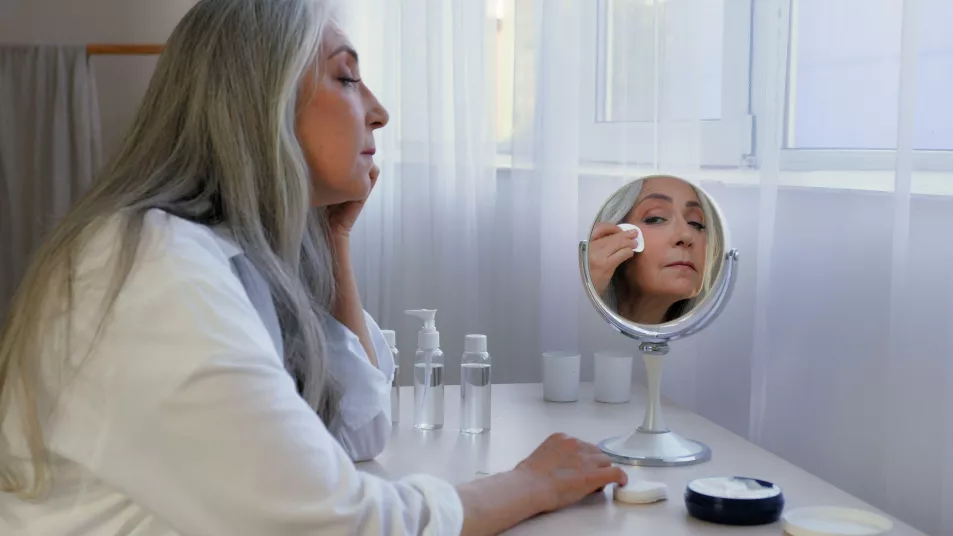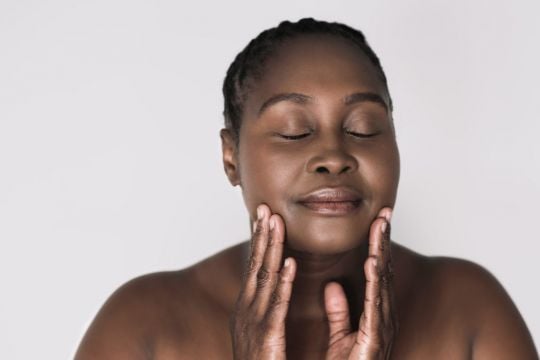Menopause can bring a host of physiological changes – and our skin is a prime example. But the effects of oestrogen and progesterone (the two key female hormones) fluctuating and dropping during midlife can begin years before our periods actually stop.
Perimenopause – the lead-up phase to menopause – can last anywhere from a few months to eight years, and the impact can creep up on us.
So, if you’re in your late-30s, 40s or early-50s, and you’ve noticed skin changes starting to occur, or you’re just not sure whether you should be tweaking your skincare regime at this point, read on. We asked trusted experts to answer our most pressing perimenopause questions…
I don’t really have wrinkles yet, but my complexion has become so uneven. Why is this, and what can I do aside from caking on make-up?

“During perimenopause your hormone levels become unbalanced and collagen levels deplete, which can lead to an uneven skin tone and change in pigmentation. Dry skin is also common at this time,” says Julia Vearncombe, co-founder of Skin:Genius.
“Rather than trying to cover up with make-up, tackle the likely causes by using products containing collagen and essential fatty acids to plump and hydrate your skin and restore radiance. You may need to change your foundation as well: those with luminescent tones will help to lift and brighten your skin, giving a youthful glow.”
I’ve always been quite basic with skincare but want to make more effort now I’m in my 40s. However, I’m not about to start spending a fortune on a 10-step regime. Which products should I be prioritising?
“If a 10-step routine is not your thing, there is no reason to add unnecessary products because you feel your skin needs more. A minimalist routine that only takes a few minutes of your time, no layering required, is still best!” says Dr Colette Haydon, dermo-pharmacist and founder of lixirskin.
“All skin shares the same essential needs, so there’s no need for a separate eye cream, neck cream, etc. I created lixirskin to deliver that special ‘good skin’ look and feel; hydrated to perfection, glowing, plump and firm.
“To address the specific need of menopausal skin, I recommend to simply add a booster to your routine. Essentially, the skin becomes thinner, which leads to sagging and a crepey texture. Our Night Switch Phytoestrogen & Peptideis a complex of liposomal genistein and collagen tripeptide designed to help improve density and elasticity of thinning perimenopausal and post-menopausal skin. Always use your booster at night, which is when the skin goes into repair mode.”
I like the skincare products I used in my 30s – do I really have to change what I’m using now I’ve reached perimenopause years?

“From age 25 onwards, our collagen is depleting every year and we start to see the ageing process happen. Also, some women will experience hormonal changes like coming off the contraceptive pill, and then perimenopause can throw our hormones into disarray. Our skin is a living organ and it reacts to many things, like stress and hormonal changes, especially in perimenopause,” says facialist Justine Masters.
“With the decline of oestrogen and progesterone, skin can become extremely dry, acne-prone, as well as more irritated and have more inflammation. We start to notice changes like pore sizes, pigmentation, fine lines and wrinkles. Our collagen depletes even further with our fluctuating hormones. We can retain less moisture and produce less oils in the epidermis and we lose volume, tone and texture. So, we might have to adjust our products to suit our skin concerns. Every skin will experience different issues. Seeing an expert can help you understand what yours needs, and find the right skincare routine to help you maintain healthy skin at any age.”
My skin seems permanently flushed across my nose and cheeks now. Are these hot flushes, or has perimenopause triggered rosacea?
“Skin flushing is very common during perimenopause, caused by increased blood flow that enlarges and dilates the blood vessels, making skin red and warm. Anxiety, stress, alcohol, coffee and spicy foods can trigger flushes, so keep a note to see if any of these affect you – and if so, try avoiding them,” says Vearncombe.
“Hot flushes generally last a few minutes before the skin calms down. If you have permanent flushing on your cheeks and nose that doesn’t respond to calming skincare products, it may be something else. Rosacea is a chronic, inflammatory skin condition whereby the skin is flushed, the texture can feel bumpy and pus-filled spots may appear. The skin feels sore, sensitive and can sting. If you have these symptoms, seek advice and if diagnosed, look for specialist products to soothe, smooth and calm the skin.”
AdvertisementView this post on Instagram
I’ve started getting a few spots and breakouts for the first time in years – what’s going on?
“Breakouts and spots aren’t just for teenagers! Hormonal fluctuations are the most common cause of acne, so during your menstrual cycle, pregnancy and perimenopause, changing hormones can wreak havoc with your skin,” says Vearncombe.
“This is because as your hormone levels change, your skin can become oiler – just as it did in your teens, clogging pores and leading to breakouts.
“Pay special attention to your cleansing routine, both in the morning and at night. The evening cleanse will remove make-up, daily grime and unwanted bacteria. The morning cleanse (which many people overlook) is key because at night, we sweat and lose between 30,000-40,000 skin cells an hour – these need cleaning away in the morning.”







